Overview
Employers prioritize clear contact information, a tailored professional summary, relevant work experience, educational background, and a well-defined skills section in resumes. Each of these elements plays a critical role in creating a strong first impression. Customization is essential; quantifiable achievements and effective formatting are key to meeting employer expectations and successfully navigating Applicant Tracking Systems.
How can you ensure your resume stands out in a competitive market? By focusing on these crucial components, candidates can significantly enhance their chances of success.
Key Highlights:
- Employers prioritize clear contact information, a compelling professional summary, relevant work experience, education, and a well-defined skills section in resumes.
- A professional summary must be tailored to each job, highlighting key achievements and relevant experiences.
- Work experience should be presented in reverse chronological order, emphasizing quantifiable achievements related to the job description.
- Keywords from job descriptions are crucial for passing Applicant Tracking Systems (ATS) and should be integrated contextually in the resume.
- Effective formatting includes a clean layout with clear headings and bullet points, enhancing readability and making documents mobile-friendly.
- Candidates should customize their applications for specific job descriptions to highlight relevant skills and experiences.
- Quantifiable achievements, such as specific metrics, are essential for demonstrating value to potential employers.
- Common resume mistakes include typos, grammatical errors, and the use of unprofessional email addresses, which can lead to swift rejections.
- Employers increasingly value a blend of soft skills (like communication and teamwork) and hard skills (specific technical proficiencies) in candidates.
- A compelling summary or objective statement should reflect key qualifications and career aspirations, tailored to the specific job.
Introduction
In the competitive landscape of job hunting, a well-crafted resume serves as a candidate’s first impression and a key to unlocking opportunities. Employers sift through countless applications, seeking standout elements that convey professionalism and relevance. Consider this: what differentiates one candidate from another in a sea of resumes? From clear contact information to a compelling professional summary, each section plays a crucial role in showcasing qualifications.
With the rise of Applicant Tracking Systems (ATS), understanding the importance of keywords and effective formatting has never been more vital. Job seekers must ask themselves: are they truly highlighting their most relevant skills? Tailoring resumes to specific job descriptions and emphasizing quantifiable achievements can significantly enhance appeal.
This article delves into essential strategies for crafting an effective resume that not only meets employer expectations but also captures attention in a crowded job market.
Key Elements Employers Seek in Resumes
When assessing applications, employers focus on critical elements that shape a strong first impression in resumes. These elements encompass clear contact information, a compelling professional summary, relevant work experience, educational background, and a well-defined skills section.
Contact Information: This should be prominently displayed at the top of the document, ensuring easy accessibility. Candidates must include their name, phone number, email address, and LinkedIn profile, if applicable.
Professional Summary: A succinct professional summary is essential, as it provides a snapshot of the individual’s qualifications and career aspirations. This section must be tailored to align with the specific job being applied for, highlighting key achievements and relevant experiences.
Work Experience: Presenting work experience in reverse chronological order is standard practice. Candidates should emphasize quantifiable achievements and responsibilities that directly relate to the job description. For instance, statistics indicate that 53% of job seekers utilize video applications, enhancing their visibility and engagement with potential employers. Boutique Recruiting acknowledges the importance of innovative techniques, such as video resumes, in linking applicants with employers effectively.
Education: This section should detail degrees obtained, institutions attended, and any relevant certifications. It is crucial to include honors or distinctions that may set the individual apart. A comprehensive abilities section should encompass both hard and soft attributes pertinent to the role. Employers increasingly seek individuals with not only technical expertise but also interpersonal skills that foster a positive workplace culture.
Understanding these foundational elements is vital for individuals aiming to create applications that resonate with hiring managers and meet employer expectations. As Eric Eddy from Boutique Recruiting observes, the firm’s capability to swiftly and effectively provide excellent prospects underscores the significance of aligning applications with employer needs. Additionally, case studies indicate that firms like Boutique Recruiting excel in identifying individuals who not only meet technical qualifications but also fit well within an organization’s culture.
This highlights the necessity of customizing applications to showcase both skills and cultural fit. By focusing on these key components, candidates can significantly enhance their chances of standing out in a competitive job market.
The Role of Keywords in Resume Optimization
Keywords are essential for optimizing job applications for Applicant Tracking Systems (ATS), widely utilized by employers to streamline the application process. Candidates must meticulously analyze job descriptions to pinpoint relevant keywords and phrases that reflect what employers seek in resumes concerning expertise and qualifications. By seamlessly incorporating these keywords throughout the document—particularly in the summary, skills, and experience sections—candidates can significantly enhance their chances of successfully passing ATS screenings.
Statistics reveal that a staggering 88% of companies using ATS technology inadvertently screen out qualified applicants due to the absence of appropriate keywords in their documents, according to Robert Henderson, a Resume Expert. This emphasizes the necessity for applicants to be strategic in their keyword selection. However, it is crucial to avoid the pitfall of keyword stuffing, which can create a negative impression on hiring managers.
Instead, a balanced approach that integrates keywords contextually within the narrative of the document is highly recommended. Moreover, it is important to note that 51% of documents include buzzwords, cliches, or incorrect pronouns, which detracts from their value and clarity. Case studies emphasize the effectiveness of utilizing role-specific and industry-specific keywords, illustrating what employers look for in resumes. Individuals who customize their applications in this way not only distinguish themselves in the automated sorting process but also attract the notice of hiring managers.
As we transition into 2025, the significance of keywords in optimizing applications remains crucial. Candidates should stay updated on the latest trends and best practices to ensure their materials resonate with both ATS and hiring professionals. Boutique Recruiting’s history of success further highlights the effectiveness of personalized recruiting services, aligning with the overall theme of optimizing applications for better job placement outcomes.
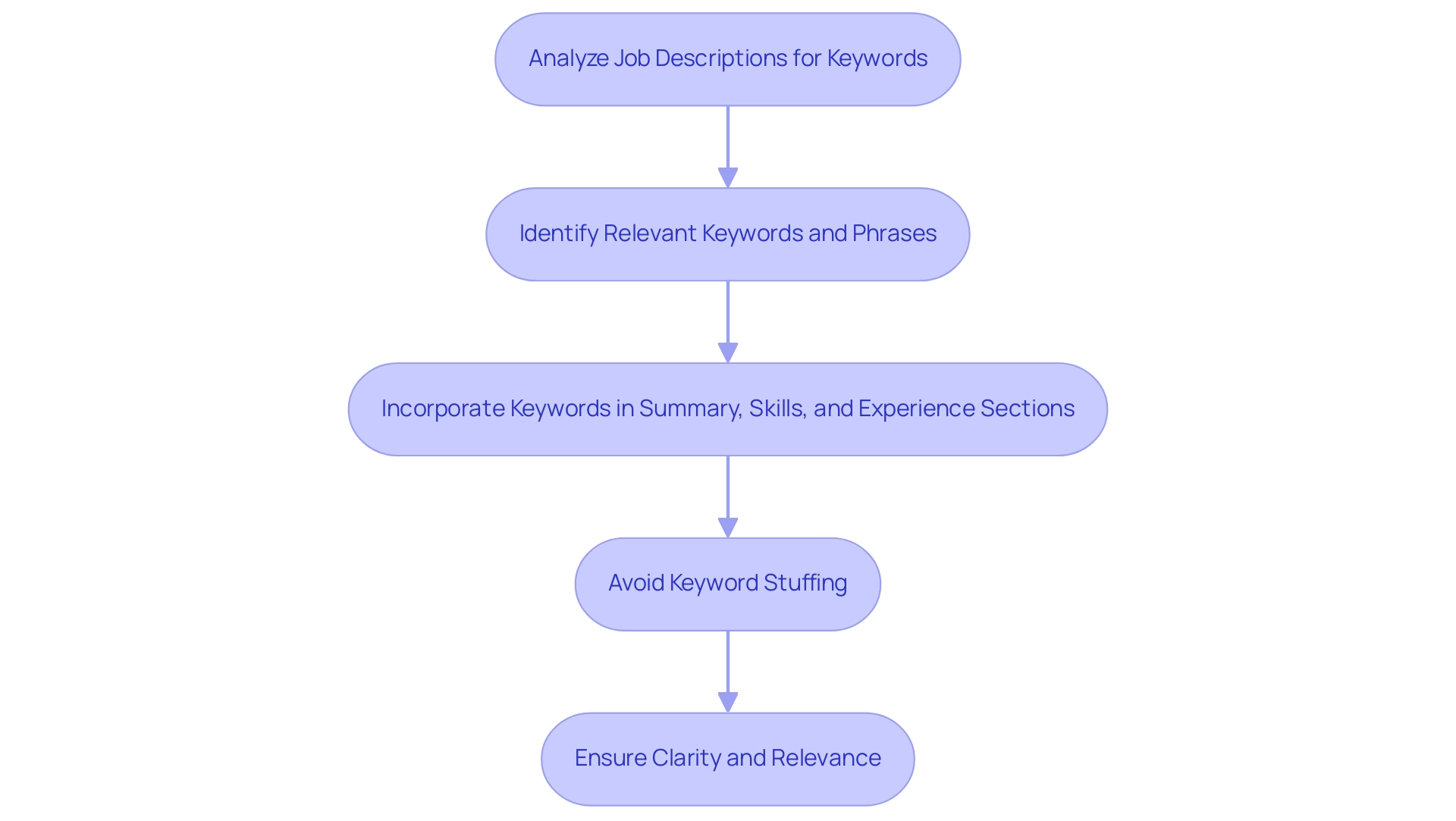
Effective Formatting: Making Your Resume Stand Out
Effective formatting is paramount for crafting a document that commands attention. Candidates should embrace a clean, professional layout with clear headings and bullet points to enhance readability. In 2025, a minimalistic design is preferred, allowing hiring managers to quickly pinpoint relevant information.
Research reveals that 50.2% of job seekers utilize mobile devices for job searches, highlighting the necessity for application materials to be mobile-friendly and easily scannable. Additionally, with 53% of job seekers showcasing their abilities through video presentations, applicants should consider integrating this modern approach to set themselves apart.
Fonts such as Arial or Calibri are recommended for their professionalism and clarity. The overall structure must adhere to a logical progression:
- Commencing with contact information
- Followed by a summary
- Work experience
- Education
- Expertise
Consistency in formatting—encompassing font size, spacing, and alignment—enhances the polished appearance of the document.
Employers increasingly favor skills-based hiring, making it essential for applicants to comprehend what employers seek in resumes by tailoring their applications to highlight relevant skills and experiences that align with job requirements. Notably, a significant number of applications are rejected due to excessive length, generic content, and misalignment with the position. Therefore, applicants should prioritize clarity and integrity in their application materials to bolster their hiring prospects.
Eric Eddy emphasizes the importance of this customized approach, asserting that it enhances the firm’s ability to deliver exceptional candidates swiftly and effectively.
Incorporating impressive formatting techniques can further elevate a CV. For instance, utilizing strategic color accents or unique section dividers can draw attention to key areas without overwhelming the reader. Effective CV examples often demonstrate these techniques, illustrating how thoughtful formatting can amplify overall impact.
By adhering to these effective formatting recommendations, applicants can significantly improve their chances of making a favorable impression on prospective employers.
Tailoring Your Resume to Specific Job Descriptions
Customizing a job application to specific job descriptions is an essential strategy for job seekers aiming to stand out in a competitive job market. This process begins with a thorough review of the job posting, allowing candidates to align their application content with the skills, experiences, and qualifications emphasized by the employer. Incorporating relevant keywords from the job description is crucial, as it not only enhances the document’s visibility in applicant tracking systems but also demonstrates a clear understanding of the role.
Candidates should also adjust their professional summary to reflect how their background aligns with the specific position. Highlighting specific accomplishments and experiences that directly relate to the job can significantly enhance the document’s appeal. For instance, research indicates that 75% of hiring managers have encountered inaccuracies on job applications, underscoring the importance of authenticity and precision in this process.
Moreover, statistics reveal that a staggering number of candidates fail to customize their applications adequately, with many opting for generic templates. This oversight can lead to missed opportunities, as employers often prioritize the previous job experience section as the most critical part of a job application. In fact, documents that are tailored to job descriptions have a higher likelihood of making it past initial screenings, as recruiters frequently reject applications due to typos, grammar mistakes, or the use of clichés.
A case study on rejection statistics shows that many recruiters dismiss applications quickly, often due to these common pitfalls.
Additionally, it is noteworthy that pronouns are absent from 99% of applications, but there may be a shift towards including them by 2025 as diversity and inclusion become more prominent. Expert insights highlight that a well-prepared curriculum vitae is an extension of the individual’s professional identity. By tailoring applications for specific job roles, candidates not only showcase their qualifications but also highlight what employers look for in resumes, signaling their commitment to the application process.
Examples of tailored applications that led to job offers illustrate the effectiveness of this approach, reinforcing the notion that a personalized touch can make a significant difference in securing interviews. As the job market evolves, particularly in 2025, the importance of customizing applications to job descriptions will only continue to grow, making it a vital skill for job seekers.
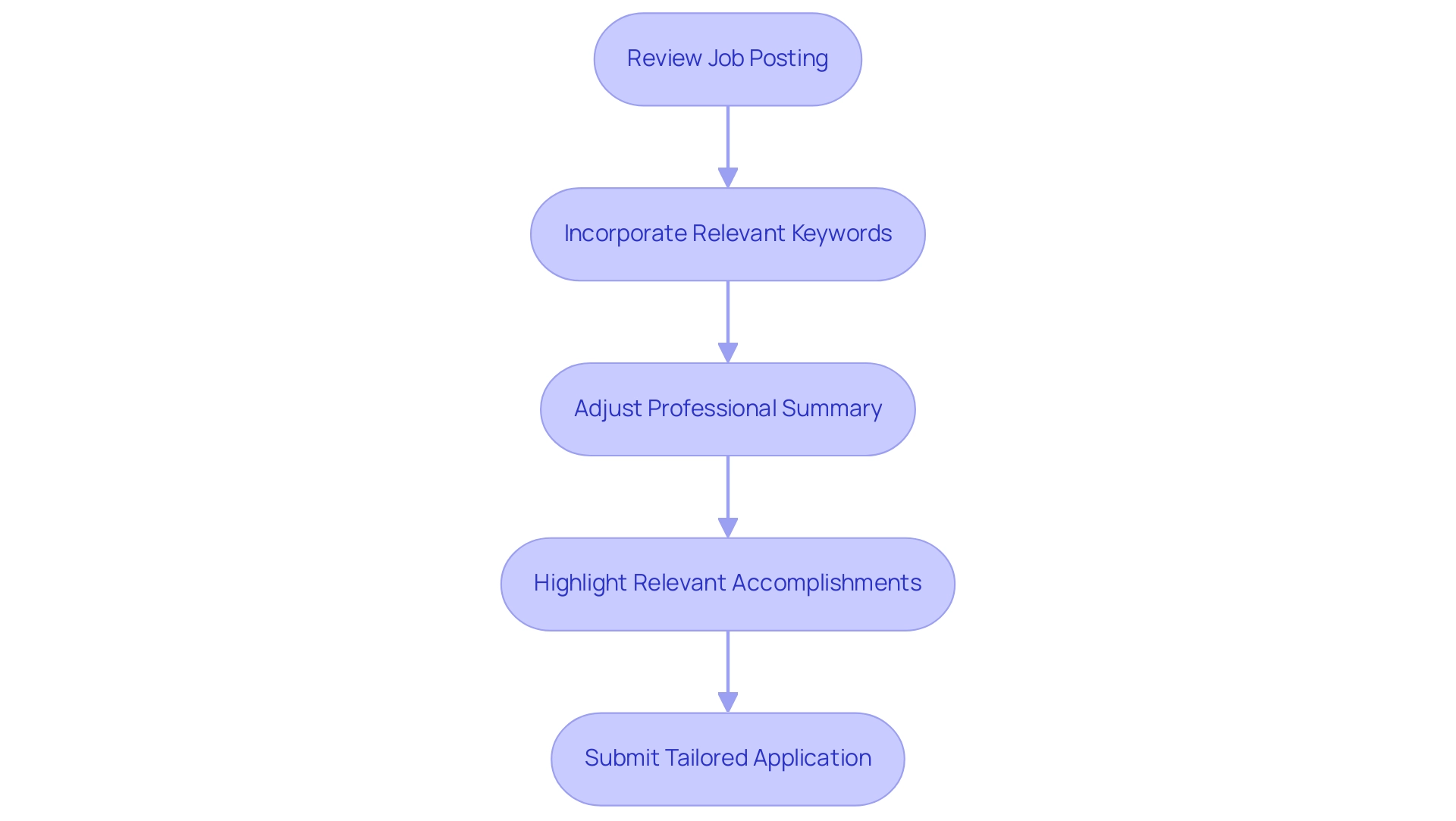
Highlighting Achievements: The Power of Quantifiable Results
Emphasizing accomplishments with measurable outcomes is a crucial tactic for individuals seeking to showcase their worth in a job application. In considering what employers look for in resumes, they increasingly prioritize measurable accomplishments, as these provide concrete evidence of an applicant’s contributions and effectiveness. For instance, rather than simply stating ‘managed a team,’ a more impactful statement would be ‘led a team of 10 to achieve a 20% increase in productivity over six months.’ This not only illustrates leadership but also showcases the tangible results of that leadership.
In 2025, the importance of quantifiable results in resumes cannot be overstated. Statistics reveal that 68% of hiring managers would reject an applicant due to a poorly articulated education section, underscoring the need for clarity and precision in presenting achievements. Additionally, applicants should emphasize specific metrics, such as:
- Decreasing customer complaints by 40%
- Increasing sales by a defined percentage
- Reducing operational costs
- Enhancing efficiency through innovative solutions
To effectively highlight achievements, individuals can utilize case studies from their professional experiences. For instance, an applicant might explain how stringent quality control measures resulted in a 99% first pass yield in production, illustrating their role in driving significant improvements. This method not only makes experiences more relatable but also enhances the overall impact of the document.
Moreover, as the job market evolves, incorporating elements like video applications can further showcase personality and skills, providing a dynamic complement to traditional formats. By tailoring applications for each position and ensuring they are machine-readable, individuals can significantly enhance their chances of distinguishing themselves in a competitive landscape. Ultimately, the ability to articulate quantifiable achievements is what employers look for in resumes, effectively positioning individuals as valuable assets to potential employers.
Boutique Recruiting’s strong track record of success as a trusted recruiting partner reinforces the importance of these strategies in crafting effective applications.
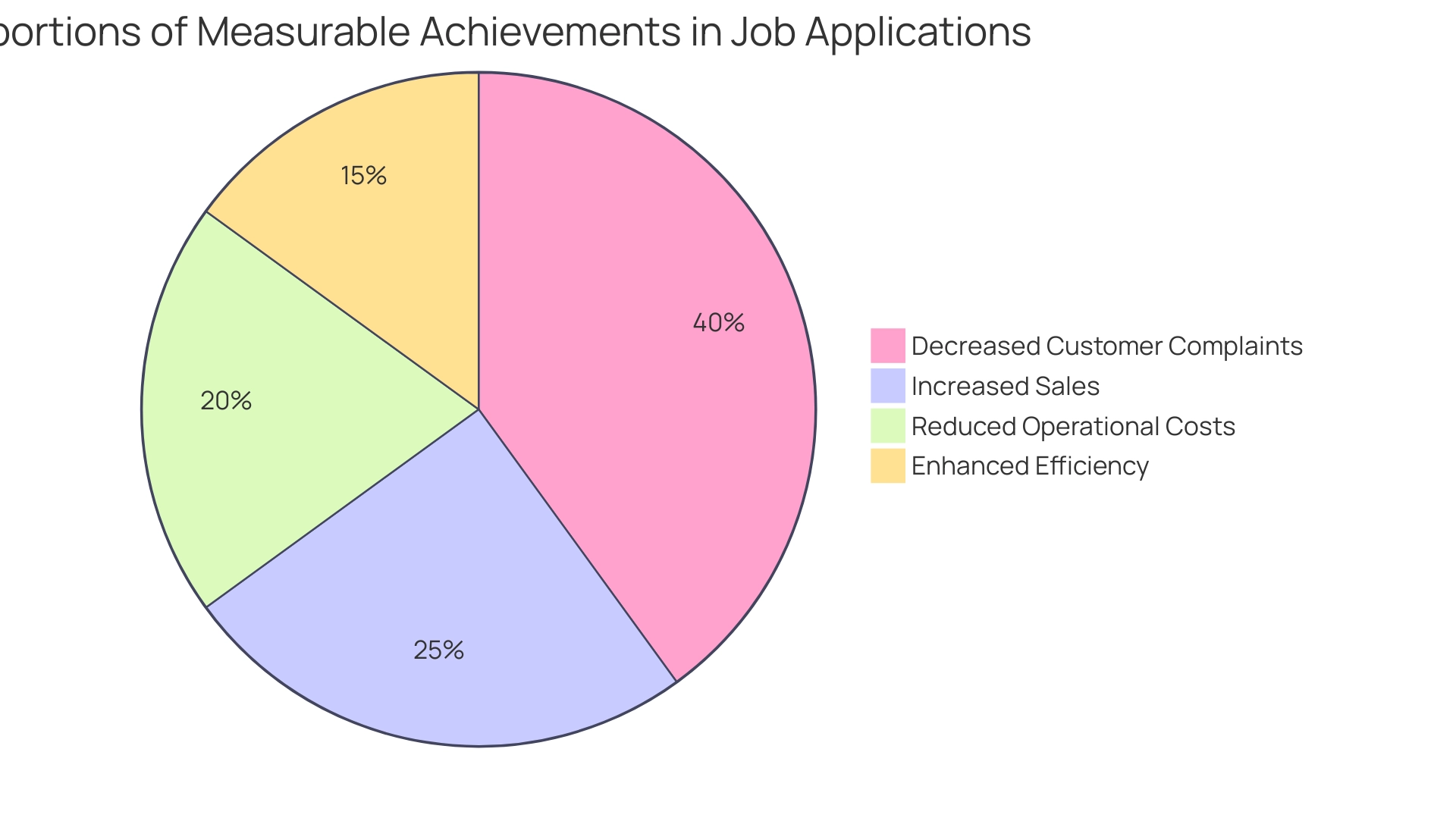
Common Resume Mistakes and How to Avoid Them
Frequent application errors can significantly diminish an individual’s chances of securing an interview, directly influencing what employers prioritize in resumes. Research reveals that employers often swiftly reject applications, with one in five candidates dismissed in under 60 seconds. Common errors that contribute to these rapid rejections include typos and grammatical mistakes, which indicate a lack of attention to detail.
Indeed, documents riddled with such errors are markedly less likely to be considered, underscoring the critical need for precision. A case study titled ‘Resume Rejection Statistics’ highlights what employers seek in resumes, demonstrating that prevalent reasons for rejection encompass typos, grammar mistakes, and the use of clichés. This reinforces the necessity for meticulousness in application preparation.
Moreover, utilizing an unprofessional email address or incorporating irrelevant personal information can undermine what employers look for in resumes. Candidates must also avoid overly complex formatting, which can bewilder Applicant Tracking Systems (ATS) and hiring managers alike. A 2023 survey disclosed that 82% of job applications lack side projects, with education and work experience dominating the content.
This lack of diversity can render a CV less engaging, emphasizing the need for applicants to showcase a broader range of experiences.
To circumvent these pitfalls, applicants should adopt a rigorous proofreading process, ensuring their documents align with what employers seek in resumes by reviewing multiple times and soliciting feedback from peers or mentors. Employing tools designed for grammar and style checks can further enhance document quality. Additionally, it is essential to ensure that the content is concise and directly relevant to what employers prioritize in resumes.
Notably, the Arial font was recognized as the most popular font for job applications in a 2023 survey of hiring managers, signaling a preference for clean and professional presentation. By focusing on clarity, relevance, and presentation, individuals can significantly improve their chances of making a positive impression on potential employers, reflecting what employers seek in resumes. As Eric Eddy from CPA Resources Global Professionals emphasizes, the ability to swiftly and effectively provide exceptional applicants is crucial, beginning with a well-crafted resume.
Essential Skills: What Employers Want to See
In today’s competitive job market, what do employers truly seek in resumes? They are increasingly prioritizing a blend of interpersonal and technical abilities in applicants. Soft skills—such as communication, teamwork, adaptability, and problem-solving—are essential as they cultivate a positive workplace culture and enhance collaboration among team members. These interpersonal abilities frequently distinguish applicants in the hiring process, rendering them invaluable assets to any organization.
Conversely, hard competencies, which encompass specific technical proficiencies related to the job, are equally critical. Candidates must meticulously analyze job descriptions to discern what employers look for in resumes that are most relevant to the role they are applying for. Highlighting proficiencies in software tools, data analysis, or project management methodologies can significantly elevate an applicant’s profile by addressing what employers prioritize in competitive sectors.
Recent trends indicate that 2025 will see a continued emphasis on both skill sets. An internal audit of 25,000 users of the application revealed that while 45% of job seekers utilized generative AI to enhance their profiles, a notable 49% of hiring managers expressed a tendency to reject applicants who relied on AI-generated content. This statistic underscores the significance of authenticity and a personal touch in resume development, a principle that aligns with Boutique Recruiting’s dedication to individualized service.
Amanda, a Northern Kentucky University graduate with a Bachelor’s Degree in Human Resources and a devoted recruiter at Boutique Recruiting, exemplifies this commitment through her tailored approach to applicant care. She believes in fostering connections with applicants to help them feel calm, understood, and confident before their interviews. Amanda began her career in recruiting for Professional and Industrial roles and was elevated to a split position, enabling her to assist external applicants while overseeing a small team of internal recruiters.
Eric Eddy, a representative from CPA Resources Global Professionals, commended Boutique Recruiting’s capacity to provide exceptional individuals swiftly and effectively, emphasizing the firm’s proficiency in grasping the distinct requirements of both employers and job seekers.
To effectively demonstrate both soft and hard skills, individuals should consider examples of CVs that balance these elements. For instance, a resume that includes specific achievements alongside descriptions of teamwork and leadership experiences can effectively showcase what employers look for in resumes. Furthermore, Boutique Recruiting sets itself apart by concentrating on establishing enduring relationships and comprehending company culture, which is essential for identifying individuals who not only meet technical qualifications but also fit well within the organizational environment.
Boutique Recruiting offers custom recruitment solutions tailored to the specific needs of technical and HR roles across various industries. Ultimately, grasping the relationship between soft and hard abilities is essential for job seekers looking to create a lasting impact in their applications, reinforcing Boutique Recruiting’s reputation as a reliable recruiting partner with a history of success and numerous satisfied clients and individuals.
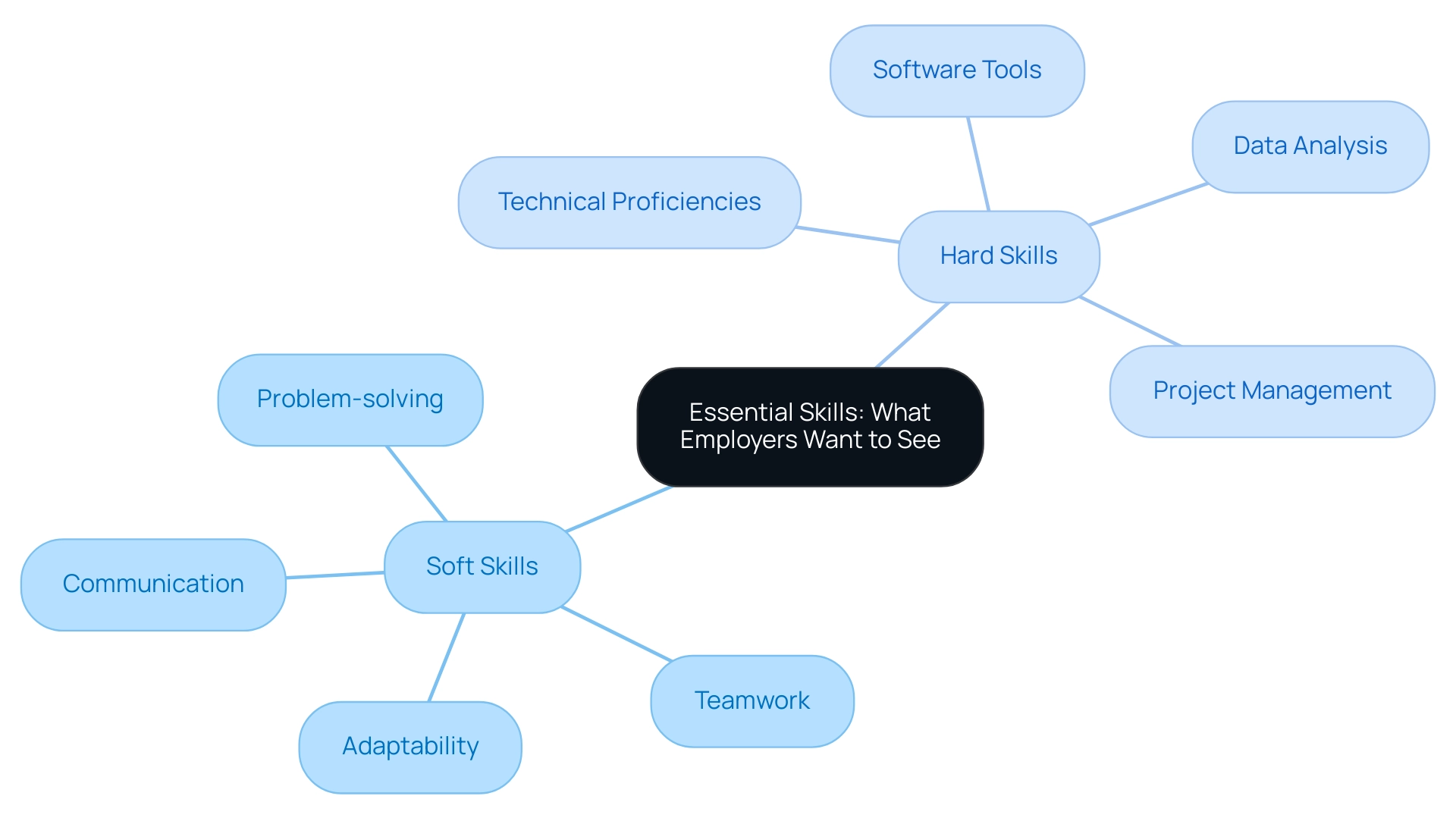
Crafting a Compelling Summary or Objective Statement
Creating a strong first impression on hiring managers necessitates a compelling summary or objective statement that reflects what employers seek in resumes. This section must effectively encapsulate an individual’s key qualifications, career aspirations, and unique contributions. For experienced candidates, a summary often proves more impactful, allowing them to showcase their achievements and relevant skills concisely.
Conversely, entry-level applicants may find an objective statement beneficial, emphasizing their eagerness to learn and contribute to the organization.
Statistics reveal that 35% of employers have rejected resumes due to unprofessional email addresses. This statistic underscores the importance of presenting oneself professionally from the outset, highlighting what employers look for in resumes. Crafting a tailored summary or objective statement not only aligns with the specific job description but also enhances the individual’s value proposition. Recruiters consistently emphasize understanding what employers seek in resumes, noting that these statements can significantly influence the decision-making process.
To create an effective summary, individuals should focus on their most relevant accomplishments and skills, using metrics to illustrate their impact. For instance, an applicant might state, “Increased sales by 30% within one year through targeted marketing strategies,” clearly demonstrating their capability and results-driven approach. Metrics enable accomplishment-driven bullet points, showcasing a results-oriented mindset that resonates with hiring managers.
By tailoring this section to reflect job requirements and company culture, applicants can significantly improve their chances of securing an interview, aligning with what employers look for in resumes. As Eric Eddy from CPA Resources Global Professionals observes, Boutique Recruiting has a strong track record of success in delivering top-quality individuals swiftly and effectively, underscoring the significance of proficient resume crafting in obtaining interviews. Additionally, the case study titled “Professional Email Addresses Matter” serves as a reminder that an unprofessional email address can negatively impact job seekers’ chances of being hired, further emphasizing the need for professionalism in all aspects of the application process.
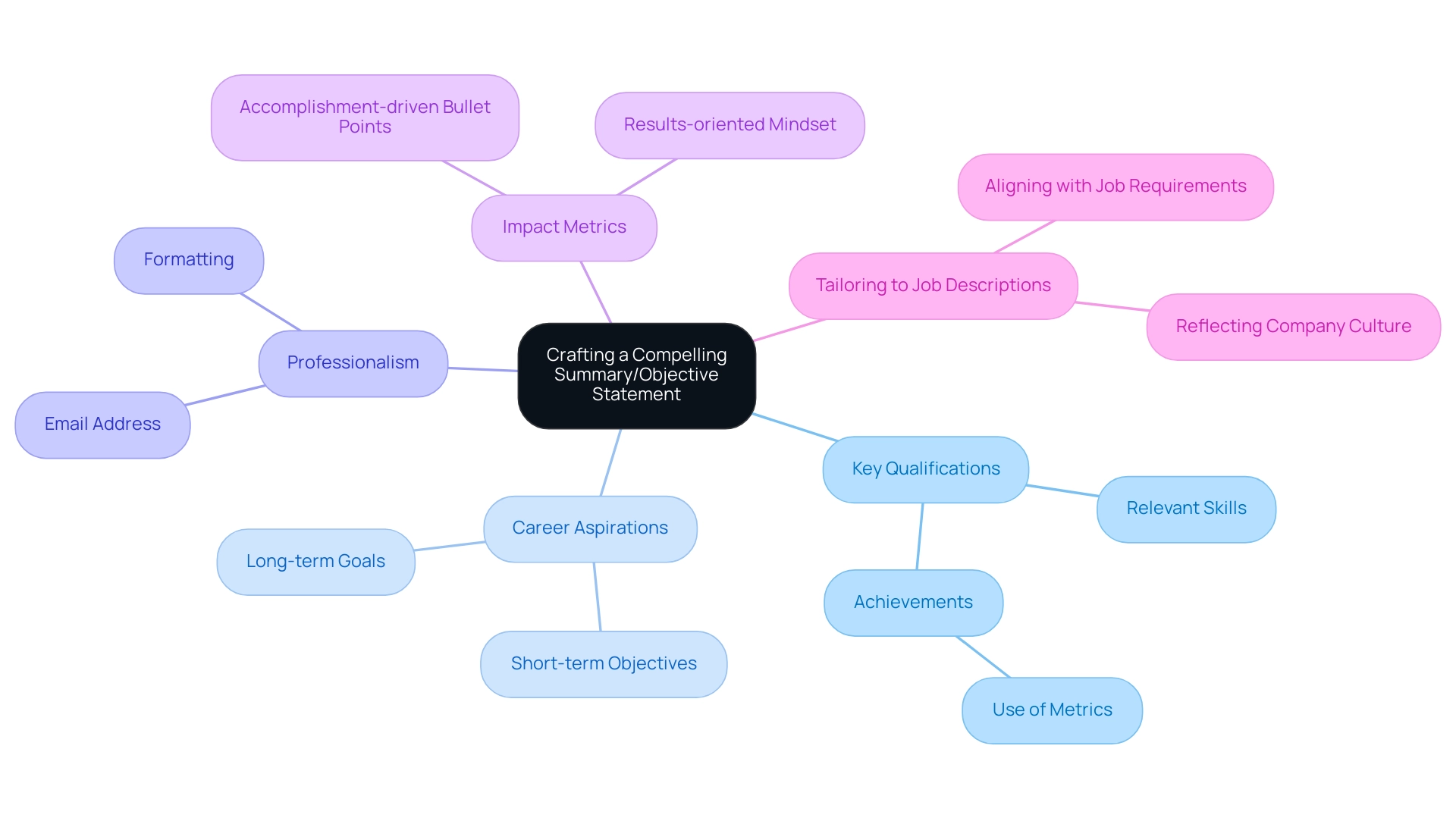
Presenting Professional Experience: Aligning with Employer Expectations
Effectively presenting professional experience is crucial for demonstrating what employers seek in resumes. Candidates should organize their work history in reverse chronological order, starting with their most recent position. Each entry must clearly state the job title, company name, location, and dates of employment.
To enhance readability and impact, bullet points should be utilized to outline responsibilities and achievements, emphasizing those most pertinent to the desired role.
Quantifying accomplishments can significantly strengthen this section. For instance, stating ‘increased sales by 30%’ not only highlights the individual’s contributions but also provides tangible evidence of their impact. This method appeals to hiring managers, as 68% suggest they would overlook an applicant due to a poorly constructed education section, underscoring the necessity for accuracy and professionalism throughout the resume.
In 2025, aligning work history with employer expectations requires understanding what employers look for in resumes, including the specific abilities and experiences that are esteemed in the industry. What employers seek includes concise, relevant information that highlights an individual’s ability to contribute effectively. Best practices for listing work history involve focusing on achievements that demonstrate problem-solving skills and adaptability, which are highly sought after in today’s competitive job market.
Boutique Recruiting’s meticulous approach to understanding company culture and specific job requirements can enhance how individuals present their experiences, ensuring alignment with employer expectations. Moreover, with 53% of job seekers now creating video applications, individuals should consider how to present their professional experience in this format as well, maintaining a professional online presence. This is further supported by the fact that 64% of recruiters have successfully identified qualified candidates through social media, highlighting the importance of a well-rounded approach to job searching.
Ultimately, candidates who customize their applications to reflect both their professional journey and what employers look for in resumes will stand out in the hiring process. By adhering to these guidelines, they can craft compelling applications that not only meet but exceed employer expectations, contributing to the strong track record of success seen by firms like Boutique Recruiting.
Key Takeaways for Crafting an Effective Resume
Crafting an effective curriculum vitae demands meticulous attention to detail and a strategic mindset. In 2025, job seekers must be equipped with essential takeaways to create standout applications:
- Key Elements: What do employers look for in resumes? Prioritizing specific components such as accurate contact information, a compelling professional summary, and relevant work experience is crucial. These elements form the foundation of a strong resume.
- Keyword Optimization: Navigating Applicant Tracking Systems (ATS) requires incorporating relevant keywords from the job description. This practice increases the chances of your application being noticed by hiring managers. Effective Formatting: A well-organized document enhances readability and generates a positive first impression. Utilize clear headings, bullet points, and consistent font styles to guide the reader through your qualifications.
- Tailored Applications: Customizing your application for each job opportunity is vital. Emphasize abilities and accomplishments that correspond with the specific role, illustrating your appropriateness for the position. Quantifying Accomplishments: Metrics can significantly enhance your perceived value. For instance, stating that you increased sales by 20% or managed a team of ten is impactful.
- Avoid Common Pitfalls: Frequent mistakes such as typos, irrelevant information, and overly complex language can detract from your professionalism and attention to detail. Steer clear of these errors to maintain a polished presentation.
In 2025, the landscape of job application writing is evolving, with 45% of job seekers utilizing generative AI to enhance their documents. While this technology can be beneficial, it raises concerns about the authenticity and accuracy of AI-generated content. Thus, applicants should ensure their documents showcase their genuine abilities and experiences.
Furthermore, 42% of recruiters utilize social media to evaluate applicants, emphasizing the necessity of upholding a professional online image.
The typical duration to extend an offer is around 15 weeks, highlighting the importance of a well-prepared application in possibly accelerating the hiring process. Boutique Recruiting exemplifies this approach, successfully connecting candidates with employers by emphasizing personalized service and understanding the unique needs of both parties.
By adhering to these guidelines, candidates can craft documents that not only capture attention but also align with what employers seek in resumes, significantly increasing their chances of securing interviews. The success rates of well-crafted resumes continue to rise, reinforcing the importance of a thoughtful approach to resume writing.
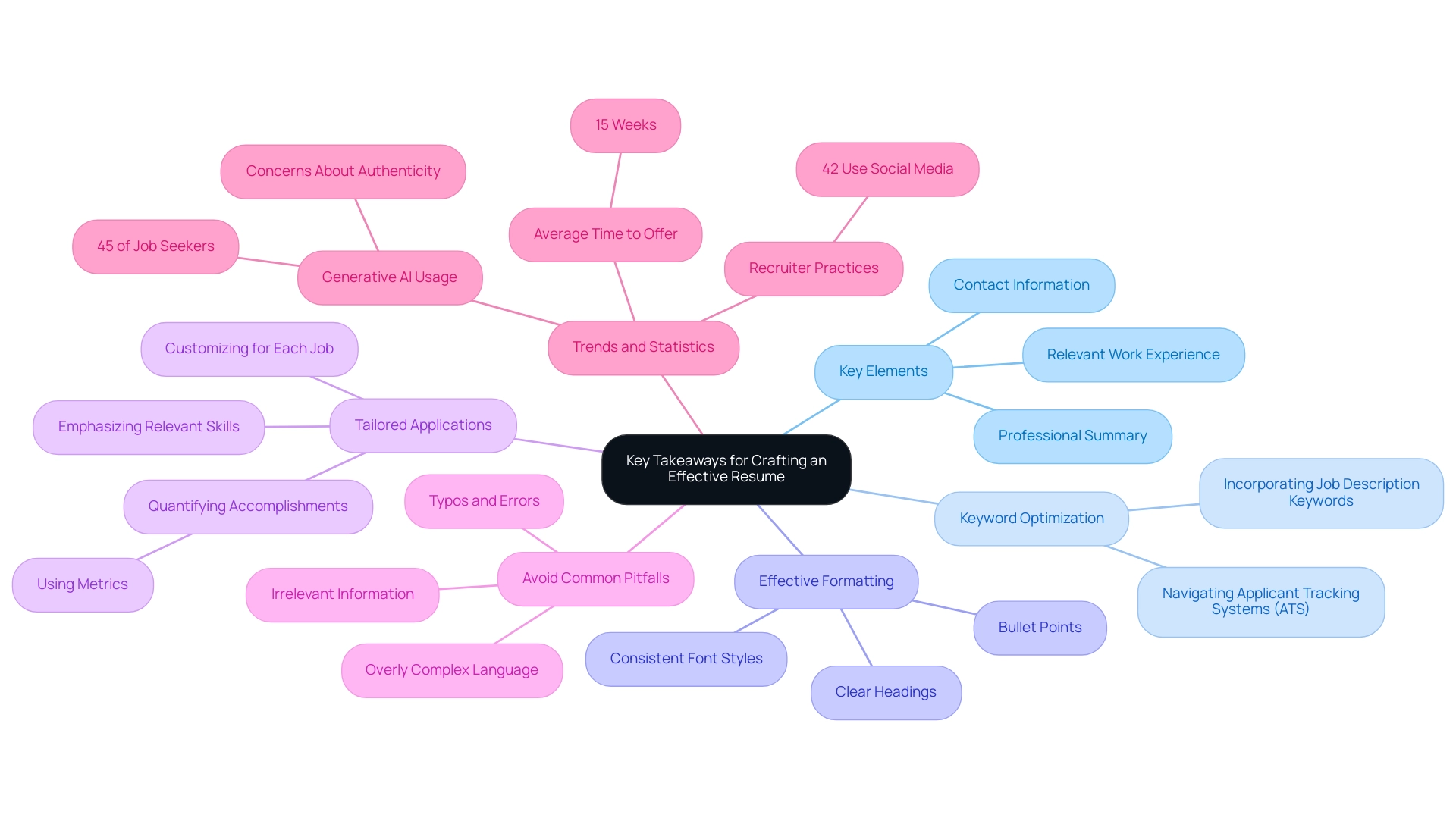
Conclusion
Crafting an effective resume is not merely a task; it is essential for navigating the competitive job market and making a strong first impression on potential employers. Key elements, including:
- Clear contact information
- A compelling professional summary
- Relevant work experience
- A robust skills section
- A well-organized education background
are critical in showcasing qualifications. The strategic use of keywords is imperative for optimizing resumes for Applicant Tracking Systems (ATS). This ensures that candidates stand out in automated screenings and capture the attention of hiring managers.
Effective formatting plays a significant role in enhancing readability and professionalism. A clean, concise layout with clear headings and bullet points allows hiring managers to quickly identify pertinent information. Tailoring resumes to specific job descriptions not only highlights relevant skills but also reflects the candidate’s commitment to the application process. Moreover, emphasizing quantifiable achievements demonstrates tangible contributions, making candidates more appealing to employers.
Avoiding common mistakes, such as:
- Typos
- Irrelevant details
- Unprofessional email addresses
is crucial for maintaining a polished and credible presentation. As the job market evolves, understanding the balance between soft and hard skills, alongside incorporating modern approaches like video resumes, can further elevate a candidate’s profile.
In conclusion, a well-crafted resume is a powerful tool that significantly increases the chances of securing interviews and job offers. By following these guidelines and focusing on authenticity, candidates can effectively present their qualifications, making a lasting impression in the eyes of employers. As the landscape of resume writing continues to change, staying informed and adaptable will be key to achieving success in the job search process.
Frequently Asked Questions
What are the critical elements employers focus on when assessing resumes?
Employers focus on clear contact information, a compelling professional summary, relevant work experience, educational background, and a well-defined skills section.
What should be included in the contact information section of a resume?
The contact information should prominently display the candidate’s name, phone number, email address, and LinkedIn profile, if applicable.
How important is a professional summary in a resume?
A professional summary is essential as it provides a snapshot of the individual’s qualifications and career aspirations. It should be tailored to the specific job and highlight key achievements and relevant experiences.
How should work experience be presented on a resume?
Work experience should be presented in reverse chronological order, emphasizing quantifiable achievements and responsibilities that relate directly to the job description.
What information should be included in the education section of a resume?
The education section should detail degrees obtained, institutions attended, relevant certifications, and any honors or distinctions that may set the individual apart.
Why is it important to include both hard and soft skills in a resume?
Employers seek individuals with technical expertise as well as interpersonal skills that foster a positive workplace culture, making it important to include both hard and soft skills in the resume.
How can candidates optimize their resumes for Applicant Tracking Systems (ATS)?
Candidates should analyze job descriptions to identify relevant keywords and phrases, incorporating them throughout the resume—especially in the summary, skills, and experience sections—to enhance ATS screening success.
What should candidates avoid when incorporating keywords into their resumes?
Candidates should avoid keyword stuffing, which can create a negative impression on hiring managers. Instead, keywords should be integrated contextually within the narrative of the document.
What formatting tips can help make a resume more effective?
A clean, professional layout with clear headings and bullet points enhances readability. Fonts like Arial or Calibri are recommended, and the structure should logically progress from contact information to summary, work experience, education, and skills.
What common mistakes can lead to the rejection of a job application?
Applications can be rejected due to excessive length, generic content, misalignment with the position, and failure to highlight relevant skills and experiences. Prioritizing clarity and integrity in application materials is crucial.